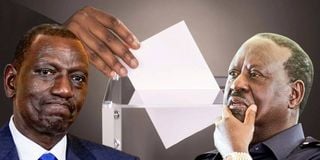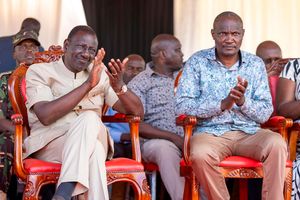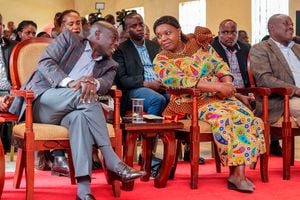
President William Ruto (left) and Raila Odinga.
The political tribulations facing Deputy President Rigathi Gachagua have presented a fresh headache to President William Ruto’s United Democratic Alliance (UDA) ahead of the party’s grassroots elections. The falling-out between the two could poison Mt Kenya, one of the UDA strongholds, thereby scuttling the polls. UDA had planned to conduct the exercise from next month following an order by the Office of the Registrar of Political Parties (ORPP) that it be concluded within 180 days.
UDA had scheduled the polls for August but they were put on hold following political unrest caused by the controversial Finance Bill, 2024. “In line with good governance practices and the mandate of this office, the party is hereby directed to finalise the party elections as soon as practically possible but not later than a hundred and eighty days from the date of this letter,” Registrar of Political Parties Anne Nderitu said in a letter to UDA in August.
Both UDA and the Orange Democratic Movement (ODM) of veteran opposition leader Raila Odinga plan to hold their grassroots elections in November amid 2027 General Election coalition talks. The two parties that have closed ranks with the broad-based government, seek to conduct the exercise when schools are on holiday.
The ODM Central Management Committee meeting chaired by Odinga last month directed the party’s National Elections Coordinating Committee (NECC) to begin preparations for the polls. “That the NECC be and is hereby directed to prepare to hold the postponed grassroots elections in the month of November,” said ODM Secretary-General Edwin Sifuna in a statement.
ODM has since made changes in its electoral body by appointing Hamida Kibwana to replace Beatrice Askul, who was appointed as Cabinet Secretary for East African Community and Regional Development. The Weekly Review has learnt that the party plans to conclude the polls then hold a National Delegates Convention to pick national officials in February after the outcome of the African Union Commission (AUC) chairmanship race.
Odinga is running for the continental job and the outcome would have a bearing on the party’s leadership. He has since handed over his role to Kisumu Governor Prof Anyang’ Nyong’o to concentrate on the AUC campaigns. NECC chairperson Emily Awita told The Weekly Review that the election team will meet to set dates and timetable for the polls.
ODM co-deputy party leader and Vihiga Senator Godfrey Osotsi said that the Central Management Committee chaired by Odinga resolved to have the grassroots elections from polling centres, to wards and constituencies in November. He said dates for county and national levels would be communicated based on the outcome of the first phase. “In November, we will have elections from the polling centres to constituency level. County and National would be announced later. This would be the first set of the elections then the party makes further pronouncements,” said Osotsi.
UDA National Elections Board chairperson Anthony Mwaura told The Weekly Review that the board will hold a meeting to set the new dates for the polls. “We are going to start them again in November when schools are closed. The plan is to have the elections concluded in all the areas by December 15,” he said.
Men in Black
UDA started the exercise in April, but was forced to stop after only Busia and Homa Bay, out of the initial five counties that were scheduled in the first phase. Constituency level elections in West Pokot were postponed over reports of possible violence while Nairobi and Narok were stopped following petitions challenging the credibility of the process.
Party elections have in the past turned divisive and chaotic. An attempt by ODM to hold party elections at the Moi International Sports Center, Kasarani, in 2014 aborted after a group of youth dressed in black, famously known as ‘Men in Black’, stormed the venue and bungled the programme. It later emerged that the youths were hired by some senior party officials to avert what was claimed as an attempt by some external forces to take over the party by planting their proxies in key positions.
In 2021, ODM engaged in consensus-building in one county after another in picking party officials that culminated in a National Governing Council (NGC) in Nairobi. In Jubilee, then-President Uhuru Kenyatta declined to call for party elections even as his then-deputy, Dr Ruto, sustained pressure for party members to participate in electing officials.
Jubilee installed interim officials with plans to have elections within three years, but Kenyatta refused to call the polls after it emerged that Dr Ruto was plotting a takeover of the party in preparation for his 2022 presidential bid. Kenyatta would later, after kicking out Dr Ruto’s allies, hold the National Delegates Conference (NDC) where his camp was installed in key positions. Jeremiah Kioni was picked to replace Raphael Tuju as the Jubilee Secretary-General.













